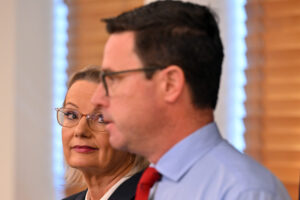Labor repeats support for territory Senator increase – revisits missed opportunity from last term

Share
Labor says it will push to double the number of senators for the ACT if re-elected. Finance Minister Katy Gallagher told ABC Canberra: “it’s certainly something we all support”.
The ACT and the NT have had two senators each since 1975.
The Liberal–National Coalition opposed the territories getting Senate representation, but the Liberals reliably won one Senate seat in each territory until David Pocock won the second ACT Senate seat in 2022.
When the ACT and NT elected their first senators, their populations were only 197,623 and 97,090 people respectively. Since then, the population of both has more than doubled.
While there is one ACT Senator per 227,000 Canberrans, the ratio in Tasmania is 1 Senator per 46,000 Tasmanians.
A multi-party parliamentary inquiry recommended in 2023 that the number of territory Senators be doubled to 4 per territory.
The Australia Institute has previously advocated for a ‘simple formula’ that would make territory Senate representation ‘proportionate to Tasmania’s population’.
Doubling the ACT’s Senate seats would not achieve this, but it would be a big step in the right direction.
An increase in territory Senators is part of the 10 reforms proposed in The Australia Institute’s Democracy Agenda for the 48th Parliament.
The Albanese Government was planning to increase territory Senator numbers in its first term but dropped the reform after the Coalition said it was opposed. Instead, the Labor and Liberal parties did a deal to pass rushed and unfair changes to Australian electoral laws.
A question for Senator Gallagher and the Albanese Government more broadly is: if they are going to continue to let the Opposition decide whether the territories are entitled to more Senators, it doesn’t matter whether the Labor Party “all support” the reform if they give the Liberal Party a veto over whether it happens.
Between the Lines Newsletter
The biggest stories and the best analysis from the team at the Australia Institute, delivered to your inbox every fortnight.
You might also like
The election exposed weaknesses in Australian democracy – but the next parliament can fix them
Australia has some very strong democratic institutions – like an independent electoral commission, Saturday voting, full preferential voting and compulsory voting. These ensure that elections are free from corruption; that electorate boundaries are not based on partisan bias; and that most Australians turn out to vote. They are evidence of Australia’s proud history as an
The 2025 federal election is the first where a major party received fewer votes than independents and minor parties.
While the May election result was remarkable for the low vote share going to the major parties, it was just the most recent of a very long trend.
Gender parity closer after federal election but “sufficiently assertive” Liberal women are still outnumbered two to one
Now that the dust has settled on the 2025 federal election, what does it mean for the representation of women in Australian parliaments? In short, there has been a significant improvement at the national level. When we last wrote on this topic, the Australian Senate was majority female but only 40% of House of Representatives

